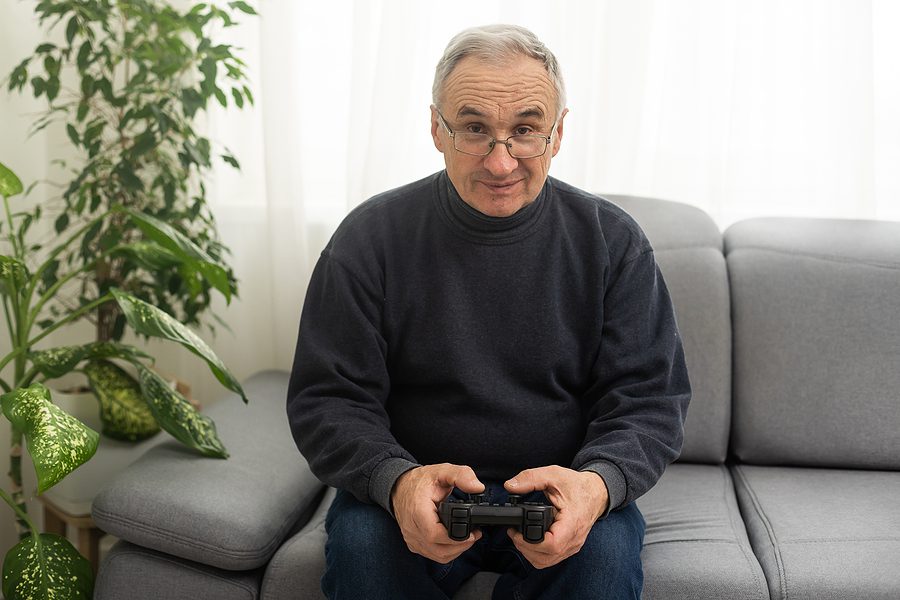After a stroke, your loved one may have issues with a number of important functions. These may include movement, sensory issues, cognition, and hand-eye coordination. Thankfully, many stroke survivors can see partial or full recovery through the practice and exercise of these functions. One way to build back these functions may be through gaming. Most video games require some level of hand-eye coordination and cognitive reasoning. Because of this, some studies are looking into the effectiveness of gaming in stroke survivors, with many showing positive results.
Why Does Gaming Help After A Stroke?
Generally, therapy and recovery care after a stroke involve brain training and task-specific motion practice. While this can include things like flash cards of important words or utensil manipulation, gaming offers a lot of similar practices. Dodging attacks in a game, or following through with quest lines can be a good way to build cognitive and physical skills back. Functions like visual attention, reaction time, and memory can all see improvement after playing video games. Just working with a controller, and pressing the right buttons can be helpful in recovery. Even simple phone games like Candy Crush can offer mental and physical training for those recovering from a stroke.
Brain Games
Cognitive training games, like Dr. Kawashima’s Brain Training, offer brain-training activities and cognitive exercises to help strengthen the mind. Dr. Kawashima is a renowned neuroscientist from Japan who has been helping Nintendo create cognitive games for many years (The older Brain Age games for Wii and handheld devices).
Crossword Puzzle Games
Crossword puzzles and other word association games have long been recommended therapy for stroke patients. Phone apps can provide puzzles at all difficulty and vocabulary levels. This helps your loved one build up their skills and continue improving. Don’t be afraid to start them off with a kid’s crossword app, first.
Gaming with Music and Rhythm
Music plays a huge role in cognitive and memory functions. Because of this, rhythm games like Rock Band, Guitar Hero, and more can help build back these skills. Often, games with music that fits their taste preferences can help improve memory. Many studies have shown the effectiveness of favorite songs in dementia patients and others suffering from cognitive issues. If you are worried about your loved one’s ability to manipulate guitar controllers, look for games that offer accessibility functions for the best results. Some even allow you to use a more standard controller as well.
Active Sports Games
Games that allow you to physically move and interact can be helpful in building back motor function and hand-eye coordination. It might be time to dust off your old Wii or Xbox Kinect for Grandpa. Additionally, there may be newer versions of these games available for this generation of consoles. Games like Nintendo Switch Sports can offer physical sports such as golf, bowling, and tennis in a controlled environment.
Playing their Favorite Games
If your loved one enjoys video games already, then get them to play some of their favorites. Gaming with their favorite titles can be a good way to make them excited to build back their functions. Accessing memories of how to get through a level or beat a certain boss can be helpful in recovery.
Gaming With Family
Video games can be a good way for stroke survivors to interact with their children or grandchildren. Just be sure that you and your children know to be patient with your loved one. They may not be able to communicate or play as effectively. This is often better left for teens or adults until your loved one is more comfortable with their post-stroke functioning.
Therapy-Specific Gaming
Some rehab centers offer gaming tools that can provide meaningful skill training to your loved one. These games are often simple yet engaging. Some will even track progress and send it to your rehabilitation specialist. This is a good way for their doctor or physical therapist to see the results of skill rebuilding. Ask your loved one’s rehabilitation specialist if they offer or recommend anything specific.
Safe Harbor Healthcare Services does not provide medical, healthcare, or financial advice via articles. This material has been prepared for informational purposes only. It is not intended to provide, and should not be relied on for medical advice.
Safe Harbor Healthcare Services has been providing excellent home care on Staten Island since 1967. Our services help the elderly and disabled live safely and independently; while giving their families the peace of mind they need. For more information contact us by clicking here, or by calling (718)-979-6900.

